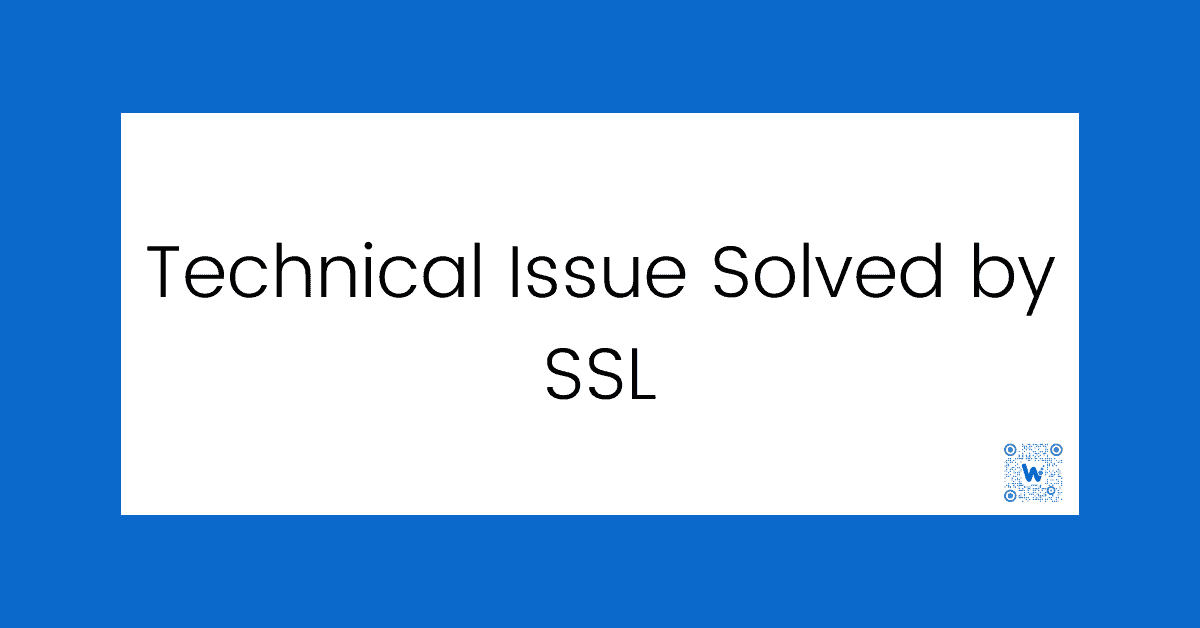Technical SEO ensures that a website’s structure and setup are optimized for search engine crawling and indexing. One essential aspect of this optimization is security, particularly as online threats and concerns about data protection grow.
SSL certificates play a pivotal role here. While SEO often brings to mind thoughts of keywords and content strategies, we cannot overlook the impact of security on a site’s search engine performance. An SSL certificate doesn’t just protect user data; it has a direct effect on how search engines view and rank your website.
In this article, we’ll explore what Technical SEO issue can you Solve with SSL Certificate?.
What Does an SSL Certificate Do?
Ever thought of SSL certificates as the digital bodyguards for your website?
If not, it’s high time you should.
When a website has an SSL certificate, it’s like it’s speaking in a secret language. This secret code ensures that sensitive information, such as credit card details or passwords, remains just that – a secret. So, when you’re shopping online or logging into your favorite site, the SSL is there to make sure all the info you put in only goes to the right place.
In the SEO world, SSL plays a crucial role. First and foremost, it’s all about safety.
Imagine walking into a store with security cameras and guards. You’d feel more at ease, right? Similarly, when users are on an SSL-protected website, they’re more comfortable sharing their details. That’s because they know the chances of any sneaky hackers trying to intercept their information are slim.
And speaking of feeling safe, have you ever noticed a tiny lock symbol by a website’s address?

That’s our trusty SSL at work. This symbol, plus the absence of those jarring “Not Secure” alerts, ensures visitors stick around and don’t leave the site in a jiffy.
Main SEO Problems Solved by SSL
Better Safety
SSL ensures enhanced security for your website. It prevents malicious actors from intercepting user information, making sure that when someone visits your site, they’re engaging with the authentic version and not a deceptive duplicate.
Making Users Feel Safe
When users see that small lock icon in their browser’s address bar, it gives them a sense of security. They know that their data is protected. Plus, an SSL certificate prevents alarming browser warnings which might deter visitors from staying on or returning to your site.
Better Website Ranking
Google’s primary concern is delivering safe and relevant content to its users. Hence, it has a soft spot for secure websites. By migrating to ‘https’, websites might gain a slight advantage in search rankings.
Setting Up SSL
Installing an SSL certificate is not a set-it-and-forget-it affair. Proper setup and maintenance are crucial.
Make Sure It’s Set Up Right
Once you decide to add SSL to your site, ensure it’s configured correctly. A partial or incorrect setup can lead to site errors or, worse, leave vulnerabilities. For instance, mixed content issues, where secure and non-secure content are loaded on the same page, can be problematic. Regularly check for such issues, especially after adding new content or plugins to your website.
Moving to ‘https’? Look Out for Mistakes
Transitioning a site from ‘http’ to ‘https’ can sometimes lead to redirection errors. It’s vital to establish correct 301 redirects from your old ‘http’ pages to the new ‘https’ versions. This ensures search engines understand the move and users don’t encounter “Page Not Found” errors.
Use Tools to Make Sure Everything’s Okay
Several tools can help ensure your SSL certificate is correctly installed and functioning. Websites like SSL Labs provide free tests to check your SSL’s setup and configuration. Regularly monitoring with such tools helps catch and rectify any issues promptly, ensuring your website remains both secure and user-friendly.
While the foundational advantage of SSL is security, its benefits ripple outwards, influencing everything from user trust to website performance. Proper setup and maintenance of SSL are, therefore, non-negotiables for any website owner or administrator.
Wrong Ideas About SSL and SEO
For SEO and website security, there are many misconceptions surrounding SSL certificates. Some of these misunderstandings may even prevent website owners from taking the necessary steps to secure their sites. Let’s debunk some of these myths and clarify the relationship between SSL and SEO.
- “SSL is only for e-commerce sites.”
One of the most prevalent misconceptions is that SSL certificates are only essential for e-commerce sites or sites that handle sensitive information, like credit card details. While it’s vital for such sites, in reality, every website can benefit from SSL. Google and other search engines prioritize secure sites in their rankings, no matter their content or function.
- “SSL doesn’t affect SEO rankings.”
This notion couldn’t be further from the truth. Google has openly stated that website security, including the use of SSL, is a ranking factor. Although it might be a minor factor compared to others, it’s still a factor. As more and more web users become conscious of online security, the importance of SSL in SEO might even grow.
- “Once I have SSL, my website is entirely secure.”
While SSL is a crucial step in ensuring website security, it isn’t a magic bullet. It encrypts data transmitted between the server and the user’s browser. However, other security measures, such as a firewall, malware scans, and strong passwords, are equally crucial for comprehensive protection.
- “Setting up SSL is a one-time task.”
Another common fallacy is thinking that once you’ve set up SSL, there’s nothing more to do. In fact, SSL certificates have an expiration date and need to be renewed periodically. Plus, with changes in security protocols and potential vulnerabilities, it’s a good practice to stay updated on the latest SSL trends.
- “All SSL certificates are the same.”
Different types of SSL certificates cater to different needs. While a basic Domain Validation (DV) certificate might be enough for a blog, an e-commerce site might require an Extended Validation (EV) certificate, which has a more rigorous validation process and offers higher security.
Clearing Up Some Misunderstandings
It’s clear that there’s a lot of misinformation about SSL and its role in SEO. The critical thing to remember is that SSL is a fundamental aspect of overall website security, and it does impact SEO, albeit in a relatively minor way for now. However, as user expectations evolve and online security becomes even more crucial, we can expect the importance of SSL in SEO to grow.
Facts Only, No Rumors
It’s essential to base decisions about your website’s security and SEO strategies on accurate information. Rumors and misconceptions can lead site owners astray, potentially harming their site’s performance and credibility. By focusing on the facts and staying updated on the latest trends and guidelines from trusted sources, website owners can ensure they’re making the best decisions for their site and their users.
Wrap-up
SSL isn’t just a nice-to-have feature; it’s becoming an essential component of every website. Beyond the obvious security benefits, it plays a role in how search engines rank your site. If you’re serious about optimizing your site for search engines and providing the best experience for your users, ensuring your website is secured with an SSL certificate should be on your checklist.
Remember that SSL doesn’t just protect data; it boosts trust among your site visitors and has positive implications for your SEO efforts. In the ever-evolving landscape of the internet, it’s those websites that prioritize both user experience and security that stand out and perform best.









